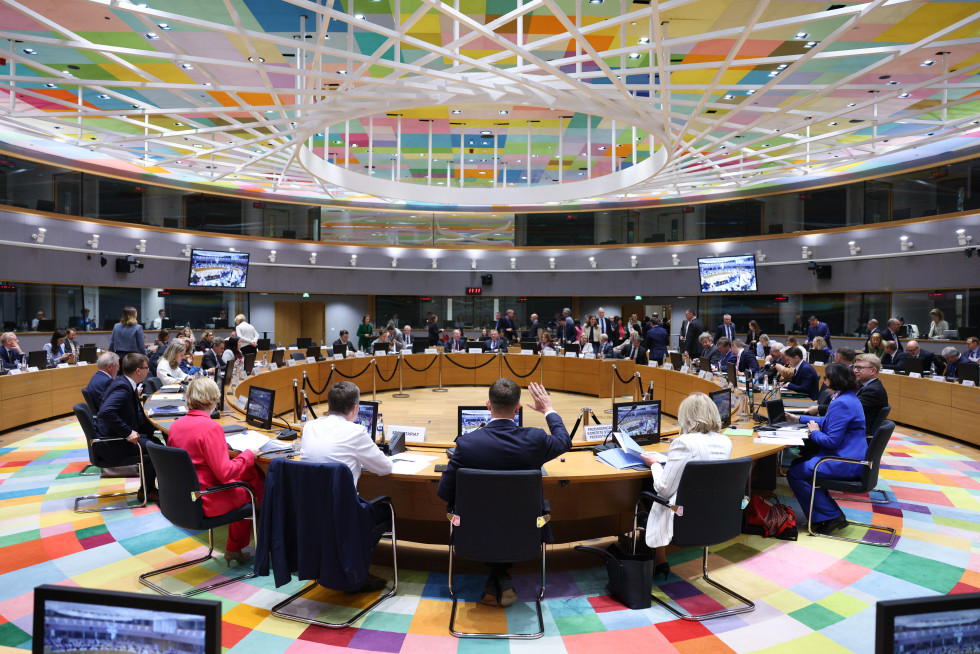State Secretary Štucin at General Affairs Council meeting in Brussels
Ministers endorsed the political agreement on the proposed amendment to the Regulation on the simplification of the EU Carbon Border Adjustment Mechanism (CBAM), which is expected to significantly enhance the competitiveness of the European economy while maintaining environmental integrity of the Mechanism. They also discussed a set of conclusions related to the EU’s democratic resilience.
During the preparations for the European Council meeting, State Secretary Štucin expressed support for the proposed agenda items (war in Ukraine, latest developments in the Middle East, European security and defence, the role of the EU in the world, competitiveness and migration), and advocated for a discussion among leaders on the Western Balkans, aimed at reviewing the conditions in the region and sending a positive signal regarding EU integration.
He stressed the importance of comprehensive support for Ukraine, including efforts to achieve a just and lasting peace in accordance with the UN Charter, and support for Ukraine's EU accession. The leaders' discussion on the situation in the Middle East is even more important, and Slovenia expects clear and targeted conclusions. The State Secretary underlined that the Council should focus on priority areas such as unimpeded humanitarian access to Gaza, addressing the responsibility for violent and unlawful acts in the West Bank, reviewing the EU-Israel Association Agreement and maintaining the prospect of a Two-State solution as the only viable path to peace. The State Secretary welcomed the decision by the Foreign Affairs Council in May to lift sanctions against Syria, while noting the need for ongoing monitoring of the situation in the country.
The leaders' discussion on defence and security is vital for continuing work in the areas agreed upon in March. Slovenia highlighted the importance of defence spending, which bolsters the national defence industry and facilitates the involvement of SMEs and research institutions. Slovenia promotes the focus on the EU’s global competitiveness, productivity and growth in relation to trade, and more efficient functioning of the Single Market.
Spain reiterated its initiative to include Catalan, Basque and Galician as official EU languages under regulation No. 1/1958 on the use of languages in the European Economic Community. State Secretary Štucin supported the proposal, reaffirming Slovenia’s commitment to multilingualism, and expressed hope for a constructive resolution of other outstanding issues, particularly legal ones.
The Council held a hearing as part of the Article 7(1) TEU procedure regarding Hungary’s adherence to EU fundamental values. Slovenia supports the continuation of this procedure, considering it a key mechanism for safeguarding these values. Council members also discussed developments in other countries as part of the annual country-specific discussion on the rule of law. Slovenia promotes the European Commission’s efforts to strengthen the rule of law and maintain an open, respectful and constructive dialogue between Member States, fostering a discussion that contributes to an efficient functioning of judicial systems and reinforcing trust in the EU's rule of law institutions.
Under ‘any other business’, the Czech delegation provided an update on the current situation regarding the financing of Radio Free Europe and possible further steps. Given the broadcaster’s important role, particularly in regions where press freedom is at risk, Slovenia has previously expressed its support for this initiative.
On the sidelines of the meeting, the State Secretary met with the German Minister of State for Europe, Gunther Krichbaum. They reaffirmed the positive relations between their two countries, focusing on EU enlargement. Both Slovenia and Germany will continue to improve the enlargement process, which should be based on equal conditions for all candidate countries in the Western Balkans and the Eastern Trio.
GAC members also held a breakfast meeting in the configuration of Ministers for the Future with European Commissioner Glenn Micallef. The working lunch with European Commissioner Michael McGrath focused on EU's democratic resilience in view of the preparations for the European Democracy Shield, an initiative aimed at strengthening the EU's capacity and defence against growing threats to democracy.


